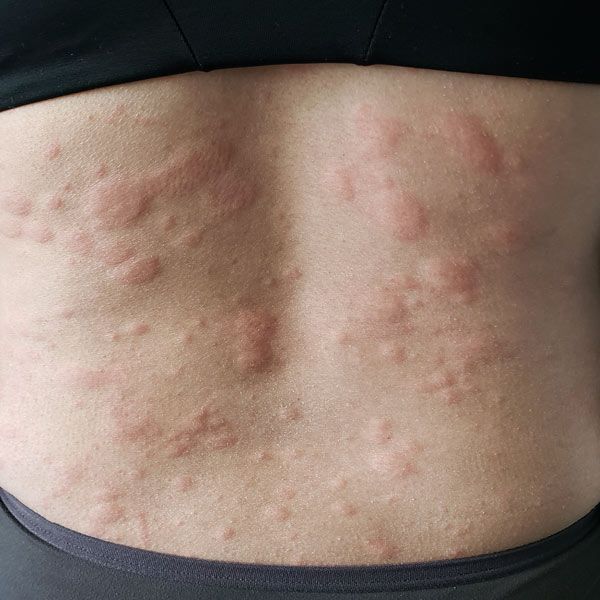What are Food Allergies?
Food allergies are particularly troubling because they are digestive and immune system disorders that can trigger autoimmune diseases. The reactions arise when the immune system detects something in the food and declares it a threat. The immune system activates to neutralize the item and protect the body. People may ignore the problem because of a mild reaction during the first experience. Consuming the food again could become a more serious concern because the body remembers the sensitivity, and the immune system will attack more vigorously, causing more severe allergy symptoms.
The ability to consume a small amount of the product without any negative consequences could signal a food intolerance instead of an allergy. Lactose intolerant individuals, for example, can often enjoy a piece of cheese or a small serving of yogurt without complications. However, allergies can cause severe reactions to the smallest amount of the offending food.
Common Symptoms of Food Allergies
Food allergies can begin without any known cause. Some people have a heightened risk of the problem due to a family history of allergies. One allergy can cause people to develop others.
Someone with hay fever, for example, has a greater risk of developing food allergies than someone without any other sensitivities.
Asthma is another condition of concern. People with asthma have a substantial risk of food allergies, and a reaction could aggravate their breathing problems.
Exposure to known trigger foods can happen more frequently in infants and toddlers. Exposure to a "problem" food like peanuts or shellfish while young could cause a mild reaction that becomes a severe allergy when they consume it again. The digestive system becomes hardier as children mature, so waiting to give children products like eggs or peanuts until they are older will reduce the risk of an allergy developing. Some of the most common symptoms include:
- Itchy or tingling sensations in the mouth
- Angioedema - swelling around the throat, mouth, face, or order parts of the body
- Hives
- Trouble swallowing
- Allergic Conjunctivitis - Sneezing, hay fever like symptoms
- Vomiting and nausea
- Shortness of breath
- Wheezing
- Anaphylaxis - trouble breathing, chest tightness, swollen tongue, dizzy, collapse.
- Lightheadedness or feeling dizzy
- Diarrhea or constipation
- Abdominal Pains
- Itchy, reddened, or cracked skin
How the Medical Community Treats Food Allergies
The medical community usually does not offer treatment for food allergies. The emphasis is to recommend people do all they can to avoid trigger foods and treat the reaction as needed. One exception is oral immunotherapy. Some studies involving this approach are taking place to determine the safety and effectiveness of the treatment.
First, the researchers give children with allergies small amounts of the offending foods. Then, they slightly increase how much the child gets if they prove tolerant of smaller portions. Over time, the body becomes accustomed to the item, and the reactions end. The results show that nearly 80 percent of the subjects in completed studies overcame their allergies. Epicutaneous and subcutaneous immunotherapy testing, where allergens are applied to the skin surface or below, have shown varying degrees of success.
Holistic Natural Remedies for Food Allergies
- Supplements - An effortless way to strengthen the immune system for fewer allergic reactions is through herbal supplements. In addition, the use of supplements can help people develop a more balanced digestive system. Studies have shown a connection between gut health and food and environmental allergies. Many supplements also provide a natural antihistamine that can prevent some allergic reactions and reduce the severity of others.
- Acupuncture - helps boost blood flow and balance the chi for many health benefits. Studies show that acupuncture can also reduce many of the symptoms of an allergic reaction. However, some people experience improvement after one session, and others need multiple treatments before the benefits become apparent.
- Chiropractic Care - The proper alignment of the spine relieves stress on the nervous system, which allows the immune system to function better. A healthy immune system works more effectively and is less likely to overreact and attack non-threats like food products. An alignment also improves blood flow, breathing, and digestion. As the body works more efficiently, it can withstand higher levels of allergens without resorting to severe reactions.
- Nutrition Response Testing - This non-evasive natural healing modality measures how your muscles react to certain stimulus. It is based on the concept that your body knows what's wrong with it and is trying to let you know. A skilled NRT Practitioner can be very accurate in their diagnosis and treatment plan. As you body heals, frequent retests are needed to adjust your healing strategy.
Alternative medicine offers natural treatments with the potential to reduce or eliminate allergic reactions. Anyone who suffers from allergies severe enough to cause anaphylactic shock can use homeopathic remedies but should remain protected with their usual treatments as they begin the process. Natural remedies take time to work and cannot immediately prevent or correct an allergic reaction.
See Your Local Holistic Practitioner. These can include muscle testers like Applied Kinesiologists and Nutrition Response Testers, many of whom are Chiropractors. You can also consider Functional and Integrative Medical Practitioners, many of whom are holistic doctors. Depending on your symptoms, trained Dietitians and Nutritionists can also be an option.
Adding
whole food supplements to your treatment plan adjusts the imbalances in your body. Being under a professional's care will help eliminate trial and error, and wasted money spent on remedies that may not be appropriate for your exact illness. Most holistic practitioners offer a free consultation, so seeing two or three is an option. It would be wise to start here.
Additional Resources
- Food Allergy Overview - Mayo Clinic
- How to Prevent Peanut Allergy and More - National Institute of Health
- Anaphylaxis - Food Allergy Research and Education (FARE)
- Treatment for Living With Food Allergies - National Institute of Allergy and Infectious Disease
Additional Information - Contact
Copyright 2020 All Rights Reserved. Art Licensed by Shutterstock©



